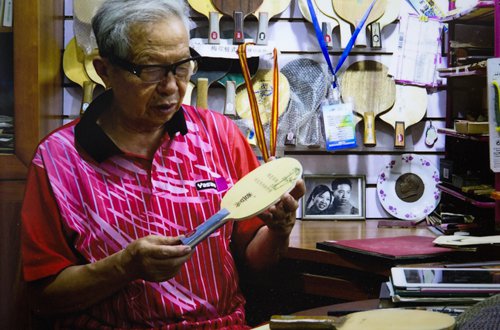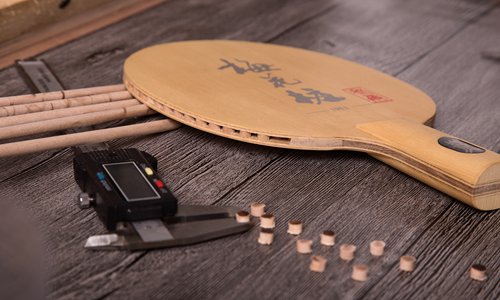
Cao Lixi holds a paddle produced in his workshop. (Photos: Courtesy of Wu Wei)
Cao Lixi, 81, still spends a lot of time innovating on ping pong paddles (table tennis rackets) in his small workshop in Chengdu, Sichuan Province, where his paddles hang on the walls and tools clutter his table.
Previously a bench worker in the Chinese army, Cao has spent more than 60 years repairing and making table tennis rackets, winning many thumbs-up from world cup champions. In this time, Cao has repaired over 800 paddles.
Originally this was just a hobby for Cao, who has played the popular Chinese sport since he was a teenager. Now, the man is the owner of two patents and his persistence has made him well-known, particularly in a modern era where traditional craftsmanship is rare and cherished.
But it is not only a hobby. Seeing that players for Chinese national teams mostly use foreign brands, Cao has endeavored to make the best Made-in-China ping pong paddles exclusively for Chinese players. This patriotism is the biggest drive behind his efforts today.
"I hope that our players will use my paddles, as weapons with domestic patent, when they fight foreign players," Cao told the Global Times. He calls it "winning an honor" for the Chinese people.
Self-taught talent
Cao purchased his first table tennis racket in 1953 at age 16, right after graduating from middle school and joining the army. He used five out of his six-yuan subsidy to buy it.
A bench worker in the department in charge of repairing guns and firearms, Cao was very skillful with his hands and liked to study the structure of things. Combined with his affection for table tennis, he started to investigate ping pong paddles and tried a number of ways to make them more player-friendly.
In 1956 he was sent to a field unit. Seeing that the inner tiers of abandoned cannons were elastic, he pasted a piece of elastic on a paddle and found it worked well. In the beginning, he only repaired his own rackets, but gradually repaired rackets for others.
Later, Cao grew dissatisfied with the quality of rackets being mass-produced in factories, so he started to buy tools to make rackets himself. It was a job that needed extreme concentration and precision, involving accurate parameters for every procedure.
Thanks to his years of study, Cao managed to have two of his inventions win patents: a trampoline-style bamboo fiber paddle and a reputed Meihuazhuang paddle that consists of 274 rice-size wood grains to support the board.
A paddle has three parameters in its elasticity, speed and controllability, and a good paddle aims to find a perfect balance between the three. Cao's rackets are thick and light and resilient at the same time, finding inspiration from a variety of wood and fibers, similar to Edison's search for lamp filament. His paddles are branded Xi, named after the last character of his name.

A Meihuazhuang paddle
Meeting a demand
Even though Cao's paddles continue to sell well both online and offline, he continues to repair other people's paddles, a service he has provided for the past 60 years.
Among his customers are many big names in the world of table tennis, including Xiao Zhan, coach for the women's team of the national table tennis team, Zhu Yuling, champion at the ITTF Women's World Cup, and Qiu Yike and Wang Manyu, who are also champions in international contests.
"When repairing rackets, we have a chance to know the inner structure and materials for rackets of all brands around the world, which helps us get big data about the rackets and can improve our techniques in the end," said Wu Wei, a senior engineer born in 1976 who works as Cao's partner.
Cao charges only around 40 yuan ($6.27) for his repair service even though it may require even more technique and time than producing a new paddle.
A table tennis player himself, he knows that people develop personal relationships with their paddles. "People always say 'a player and a paddle are one.' Some people feel uncomfortable with a new paddle," said Cao.
Top players in particular, who are very sensitive to the weight, thickness and resilience of their racket, and whose performance could be greatly affected by it, prefer to repair their old paddles than buy new ones.
Carrying on the spirit
Vigorous despite his age, Cao keeps up with the times, updating his WeChat posts daily to share news and activities related to table tennis and his paddle business.
He is never shy about his grand ambitions. "Chinese players are the best in the world, but the paddles they use are mostly originated from Japan, Sweden or Germany," said Cao.
Wu spends all his spare time learning from Cao how to make and repair ping pong paddles.
A table tennis lover, he first met Cao in 2015 while searching for a good racket. The two joined forces, and Wu now also helps Cao sell his paddles on Taobao and WeChat, where many players, including foreigners, are attracted by his reputation.
As a traditional craftsman, however, Cao is worried that many old-fashioned skills are disappearing from Chinese society. Personally, he fears that such high-quality craftsmanship will die with him.
Cao is currently searching for full-time apprentices who will carry on his craft.
Together with Wu, the duo is actively engaged in local community activities, including demonstrating to young students the craftsmanship spirit in the process of making paddles, which they think can help strengthen the younger generation's awareness of the importance of manual dexterity.


